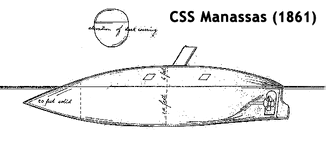(Created page with "[[File:Css_manassas_plan.gif|thumb|326px|A period sketch of the CSS Manassas in 1861 - probably our only truly accurate depiction of the vessel, since no photographs have survive...") |
No edit summary |
||
| Line 7: | Line 7: | ||
'''Home Port: '''New Orleans |
'''Home Port: '''New Orleans |
||
| + | |||
| + | '''Dimensions: '''143' Length, 33' Beam, 7' Draft |
||
| + | |||
| + | '''Armor: '''1" of Iron, with wood backing |
||
| + | |||
| + | '''Armament: '''1 x 64 pdr Dahlgren gun; later replaced by 1 x 32 pdr Smoothebore |
||
| + | |||
| + | '''Engines: '''Single Screw |
||
| + | |||
| + | '''Speed: '''4 Knots |
||
| + | |||
| + | '''Built: '''Algiers, Louisiana |
||
| + | |||
| + | '''Commissioned: '''September 12, 1861 |
||
| + | |||
| + | '''Crew: '''104 |
||
'''Fate: '''Destroyed by internal explosion, 1862. |
'''Fate: '''Destroyed by internal explosion, 1862. |
||
| Line 12: | Line 28: | ||
| + | '''Summary''' |
||
| − | <To Be Completed> |
||
| + | |||
| + | |||
| + | |||
| + | Originally commissioned as a privateer, supposedly as a conversion of the steam powered icebreaker ''Enoch Train, ''though information about the original ship and her configuration is very much a matter of conjecture. She was seized by the Confederate Navy and added to the fleet guarding the mouth of the Mississippi in late Summer, 1861. As such, while not widely known, ''Manassas'' predates the [[CSS Virginia|Virginia]] as the first ironclad vessel to serve in the American Civil War. |
||
| + | |||
| + | Her armament was probably a 64 pound Dahlgren for most of her career, but at least one period source (probably apocryphally) claims that she was, at least initially, armed with an "ancient Spanish cannon" salvaged from one of the older fortresses in the area. |
||
| + | |||
| + | At New Orleans, ''Manassas'' rammed and damaged USS ''Mississippi'' and USS ''Brooklyn'' as the fleet was attempting to pass the fortresses guarding the mouth of the river. After taking some damage during a failed attempt to ram USS ''Pensacola,'' ''Manassas ''shadowed the Union fleet for a time before ''Mississippi'' turned and engaged her with a full broadside. ''Manassas ''was forced to run aground and allow her crew to escape. When the Union attempted to take the vessel in tow, an internal explosion was sparked, destroying ''Manassas; ''this disappointed[[ Commander David Dixon Porter| Commander David Dixon Porter]] , who had hoped to salvage and preserve her as an "engineering curiosity." |
||
| + | |||
| + | We have no period photos of the ''Manassas''. The sketch above, done by an observer shortly after her commissioning in 1861, is probably the most accurate image of the ship while in service with the CSN. |
||
Revision as of 02:23, 3 October 2011

A period sketch of the CSS Manassas in 1861 - probably our only truly accurate depiction of the vessel, since no photographs have survived.
CSS MANASSAS (1861-1862)
Commissioned: 1861
Service: 1861-1862, Lower Mississippi
Home Port: New Orleans
Dimensions: 143' Length, 33' Beam, 7' Draft
Armor: 1" of Iron, with wood backing
Armament: 1 x 64 pdr Dahlgren gun; later replaced by 1 x 32 pdr Smoothebore
Engines: Single Screw
Speed: 4 Knots
Built: Algiers, Louisiana
Commissioned: September 12, 1861
Crew: 104
Fate: Destroyed by internal explosion, 1862.
Summary
Originally commissioned as a privateer, supposedly as a conversion of the steam powered icebreaker Enoch Train, though information about the original ship and her configuration is very much a matter of conjecture. She was seized by the Confederate Navy and added to the fleet guarding the mouth of the Mississippi in late Summer, 1861. As such, while not widely known, Manassas predates the Virginia as the first ironclad vessel to serve in the American Civil War.
Her armament was probably a 64 pound Dahlgren for most of her career, but at least one period source (probably apocryphally) claims that she was, at least initially, armed with an "ancient Spanish cannon" salvaged from one of the older fortresses in the area.
At New Orleans, Manassas rammed and damaged USS Mississippi and USS Brooklyn as the fleet was attempting to pass the fortresses guarding the mouth of the river. After taking some damage during a failed attempt to ram USS Pensacola, Manassas shadowed the Union fleet for a time before Mississippi turned and engaged her with a full broadside. Manassas was forced to run aground and allow her crew to escape. When the Union attempted to take the vessel in tow, an internal explosion was sparked, destroying Manassas; this disappointed Commander David Dixon Porter , who had hoped to salvage and preserve her as an "engineering curiosity."
We have no period photos of the Manassas. The sketch above, done by an observer shortly after her commissioning in 1861, is probably the most accurate image of the ship while in service with the CSN.